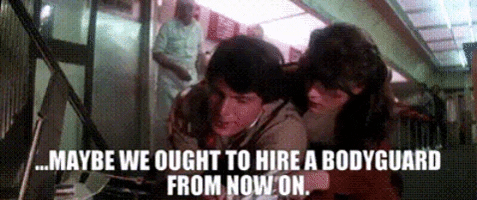Following the lead of the Lois and Clark TV show, the comic-book Superman had, at long last, put A Ring on his long-suffering girlfriend’s finger and carried her across the threshold to holy matrimony after six decades of dodging The Issue — although it was Clark Kent whom Lois married in public, while Superman had to conceal his wedding band every time he switched from his sober suit and tie.
This newly domesticated Superman was a somehow diminished figure
All but sleepwalking through a sequence of increasingly contrived “event” story lines, which tried in vain to hit the heights of
“The Death of Superman”
seven years previously.
Superman Now was to be a reaction against this often overemotional and ineffectual Man of Steel, reuniting him with his mythic potential, his archetypal purpose, but there was one fix we couldn’t seem to wrap our collective imagination around: The Marriage.
The Clark-Lois-Superman Triangle —

“Clark loves Lois.
Lois loves Superman.
Superman loves Clark,”
as Elliot S. Maggin put it in his intelligent, charming Superman novel Miracle Monday — seemed intrinsic to the appeal of the stories, but none of us wanted to simply undo the relationship using sorcery, or “Memory Wipes,” or any other of the hundreds of cheap and unlikely magic-wand plot devices we could have dredged up from the bottom of the barrel.”
- Grant Morrison,
SuperGods
“Here’s another horrifying example, an aspect of American culture, The Continued Pussification of The American Male in the form of
Harley Davidson Theme Restaurants.
What the fuck is going on here?
Harley Davidson used to mean something.
It stood for biker attitude; grimy outlaws in their sweaty mamas full of beer and crank, rolling around on Harleys, looking for a Good Time – Destroying Property, Raping Teenagers, and Killing Policemen…
All very necessary activities by the way.
Harley Davidson Theme Restaurants.
What the fuck is going on here?
Harley Davidson used to mean something.
It stood for biker attitude; grimy outlaws in their sweaty mamas full of beer and crank, rolling around on Harleys, looking for a Good Time – Destroying Property, Raping Teenagers, and Killing Policemen…
All very necessary activities by the way.
"And I wonder, too, like how much of the antipathy towards. . .
These are dark musings. And I would say, how
much of the antipathy towards men that’s being generated by, say,
college-age women is deep repugnance for the role that they’ve been
designed, and a disappointment with the men. . . You know, you think of
those. . . I can’t remember the culture.
The basic marital routine was to ride into The Village and grab the bride and run away with her on a horse.
It’s like the motorcycle gang member who rips the too-naive girl out of the bosom of her family.
Paglia: Yeah, there used to be Bride Stealing. It was quite widespread.
Peterson: Right,
so I kind of wonder if part of the reason that modern university women
aren’t so angry is because that fundamental Feminine Role is actually
being denied to them.
And they’re objecting to that at a really, really fundamental level.
Like a level of Primitive Outrage.
“There's Two Things that the Postmodern NeoMarxists are full-scale assaulting :
One is Categorisation, because They believe that
One is Categorisation, because They believe that
The Only Function of Categorisation is POWER.
The other is,
There's a War on Competence -
Because, if you admit that there are hierarchical structures that are predicated upon Competence,
then you have to grapple with the issue of Competence,
and you have to grapple with the issue of Valid Hierarchy.
If All Hierarchy is Power
and
All Power is Corrupt
and
All Corrupt Power is Tyranny
then, you can't admit to Competence.
But the downside is, there's a terrible price to be paid for that, because
Every Value System Produces a Hierarchy.
So if you dispense with the hierarchy,
You dispense with The Value Systems.
“The rise of the new feminism, the protest movements of ethnic, national and sexual minorities, the anti-institutional ecology struggles waged by marginalized layers of the population, the anti-nuclear movement, the atypical forms of social struggle in countries on the capitalist periphery — all these imply an extension of social conflictuality to a wide range of areas, which creates the potential, but no more than the potential, for an advance towards more free, democratic and egalitarian societies.”
The Point is that these new Groups of People could be Useful.
Douglas Murray,
The Madness of Crowds
[We finally find Peter lying on a mat and doing sit-ups. Ned is holding his legs in place for him.]
Ned:
Hey, can I be your
Guy in The Chair?
Peter:
What?
Ned:
Yeah. You know how there’s
A Guy With a Headset
Telling The Other Guy Where to Go?
[Peter’s face contorts into a weird expression. He is still doing sit-ups faster than any other student.]
Ned:
Like, like if you’re stuck in a burning building, I could tell you where to go.
Because there’d be screens around me, and I could, you know, swivel around, and...
‘Cause I could be your
Guy in The Chair.
Peter:
Ned,
I don’t need a Guy in The Chair.
Coach Wilson:
Looking good, Parker.
[The teacher points at Peter as he passes the mat that Peter and Ned are working out on. Peter glances at him, then frowns and takes a huffing breath, trying to look as if the exercise is really taking a toll on him.]
“That’s another issue I want to bring up, because one of the things I cannot figure out is the alliance between the postmodernists and the neo-Marxists.
I can’t understand the causal relationship.
Tell me if you disagree with this, okay, because I’m a psychologist, not a sociologist.
So I’m dabbling in things that are outside of my field of expertise. And there is some danger in that.
But The Central Postmodernist Claim seems to me that because there’s a near infinite number of ways to interpret a complex set of phenomena - which actually happens to be the case - you can’t make a case that any of those modes of interpretation are canonical.
And so, if they’re not canonical, and if that canonical element isn’t based in some kind of Reality, then it serves some Other Master.
And so The Master that it hypothetically serves for The Postmodernists is
Nothing but Power,
because that seems to be Everything That They Believe in.

They Don’t Believe in Competence.
They Don’t Believe in Authority.
They Don’t seem to Believe in
An Objective World,
because everything is language-mediated.
So it’s an extraordinarily cynical
perspective: that because there’s an infinite number of interpretations, none of them
are canonical.
You can attribute everything to
Power and Dominance.
Does that seem like a reasonable summary of the postmodern. . .
Paglia:
Yes, exactly.
It’s a Radical Relativism.
Peterson:
Okay, it’s a Radical Relativism.
Now, but The Strange Thing is, despite. . .
Okay, and so what goes along with that is the demolition of Grand Narratives.
So that would be associated, for example, with the rejection of thinkers like Jung and Erich Neumann, because of course they’re foundational thinkers in relationship to the idea that there are embodied Grand Narratives.
That’s never touched.
But then, despite the fact that the Grand Narrative is rejected, there’s a neo-Marxism that’s tightly, tightly allied with postmodernism that also seems to shade into this strange Identity Politics.
And I don’t. . . Two things.
I don’t understand
the causal relationship there.
The Skeptical Part of me thinks that Postmodernism was an
intellectual. . .
It’s intellectual camouflage for the continuation of the kind of pathological Marxism that produced the Soviet Union, and has no independent existence as an intellectual field whatsoever.
But I still can’t understand how The Postmodernists can make the “no grand narrative” claim, but then immerse themselves in this Grand Narrative without anyone pointing out the self-evident contradictions.
I don’t understand that.
So What Do You Think About That?
Gamora:
What was that story you once told me about Zardu Hasselfrau?
Quill:
Who?
Gamora:
He owned a magic boat?
Quill: [long pause]
David Hasselhoff....?
Gamora:
Right.
Quill:
Not a Magic Boat —
A Talking CAR.
Gamora:
Why did The Car talk again...?
Quill:
To help him FIGHT •CRIME•,
and to be •supportive•!
Gamora:
As a child, you would carry his picture in your pocket… and you would tell all the other children… that he was your father, but that he was out of town.....
Quill:
...shooting Knight Rider or touring with his band in Germany.
I told you that when I was drunk.
Why are you bringing that up now?
Gamora:
I •love• that story.
Quill:
I •hate• that story. It’s so •sad•...!
As a kid, I used to see all the other kids off playing catch with their dad.
And I wanted that, more than anything in The World!
Gamora:
That’s my point, Peter.
What if this man is your Hasselhoff?
If he ends up being Evil…
We will just kill him.
No comments:
Post a Comment